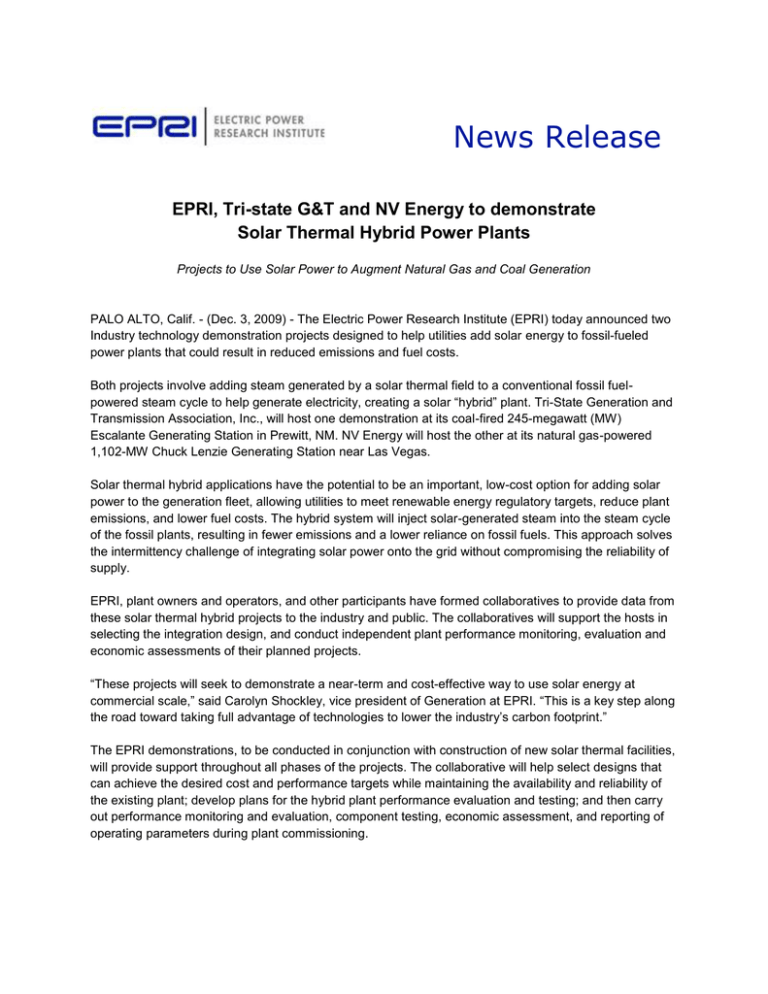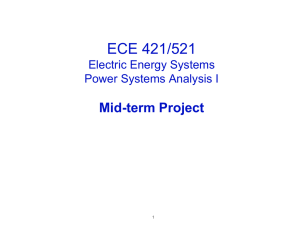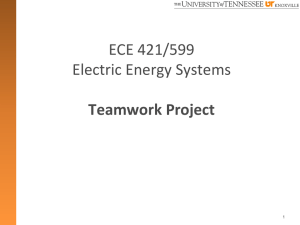News Release EPRI, Tri-state G&T and NV Energy to demonstrate
advertisement

News Release EPRI, Tri-state G&T and NV Energy to demonstrate Solar Thermal Hybrid Power Plants Projects to Use Solar Power to Augment Natural Gas and Coal Generation PALO ALTO, Calif. - (Dec. 3, 2009) - The Electric Power Research Institute (EPRI) today announced two Industry technology demonstration projects designed to help utilities add solar energy to fossil-fueled power plants that could result in reduced emissions and fuel costs. Both projects involve adding steam generated by a solar thermal field to a conventional fossil fuelpowered steam cycle to help generate electricity, creating a solar “hybrid” plant. Tri-State Generation and Transmission Association, Inc., will host one demonstration at its coal-fired 245-megawatt (MW) Escalante Generating Station in Prewitt, NM. NV Energy will host the other at its natural gas-powered 1,102-MW Chuck Lenzie Generating Station near Las Vegas. Solar thermal hybrid applications have the potential to be an important, low-cost option for adding solar power to the generation fleet, allowing utilities to meet renewable energy regulatory targets, reduce plant emissions, and lower fuel costs. The hybrid system will inject solar-generated steam into the steam cycle of the fossil plants, resulting in fewer emissions and a lower reliance on fossil fuels. This approach solves the intermittency challenge of integrating solar power onto the grid without compromising the reliability of supply. EPRI, plant owners and operators, and other participants have formed collaboratives to provide data from these solar thermal hybrid projects to the industry and public. The collaboratives will support the hosts in selecting the integration design, and conduct independent plant performance monitoring, evaluation and economic assessments of their planned projects. “These projects will seek to demonstrate a near-term and cost-effective way to use solar energy at commercial scale,” said Carolyn Shockley, vice president of Generation at EPRI. “This is a key step along the road toward taking full advantage of technologies to lower the industry’s carbon footprint.” The EPRI demonstrations, to be conducted in conjunction with construction of new solar thermal facilities, will provide support throughout all phases of the projects. The collaborative will help select designs that can achieve the desired cost and performance targets while maintaining the availability and reliability of the existing plant; develop plans for the hybrid plant performance evaluation and testing; and then carry out performance monitoring and evaluation, component testing, economic assessment, and reporting of operating parameters during plant commissioning. EPRI will rely on its expertise in solar technologies, steam cycles, and plant operation, as well as past solar and fossil plant studies, including two on solar-augmented steam cycles completed this year at the host sites for the new demonstration projects. EPRI holds two patents in solar steam cycle optimization. “Tri-State is investing in leading research in a number of innovative renewable energy technologies that bring value to our member cooperatives,” said Ken Anderson, executive vice president and general manager at Tri-State. “We are intrigued with the positive results of EPRI’s solar augmentation study that was conducted at our Escalante Generating Station and we are extremely interested in further exploring the practical application of this breakthrough technology that could further advance the efficiencies at one of our existing facilities.” NV Energy’s Renewable Energy Vice President Tom Fair said his company is encouraged by the results of initial studies of solar hybrid applications with currently existing generation assets. “We are excited about the possibility of integrating solar steam into one of our conventional natural gas fueled power stations and are pleased to be working with EPRI to leverage this state-of-the-art technology. Focusing on fully understanding the technical and economic facets of this innovative technology before seeking regulatory approvals needed for design and construction will assure that this project makes the most sense for our customers. We anticipate this could be a great way to increase our use of solar energy, reduce overall emissions and maximize the use of our existing assets,” Fair said. EPRI is supporting nine industry technology demonstrations as part of its efforts to help develop a “full portfolio” of technology approaches needed to make substantial CO2 emissions reductions while minimizing economic impacts. EPRI’s Prism and MERGE analyses (available at www.epri.com) found that deployment of a full portfolio of advanced technologies, including carbon capture and storage, could reduce U.S. electric sector CO2 emissions by 2030 to a level below 1990 emissions. EPRI currently is working on a global analysis that is expected to show similar energy mix changes and significant economic impacts. About Tri-State Generation and Transmission Association, Inc. Based in Denver, Tri-State is a wholesale electric power supplier owned by the 44 electric cooperatives that it serves. Tri-State generates and transports electricity to its member systems throughout a 250,000 square-mile service territory across Colorado, Nebraska, New Mexico and Wyoming. About NV Energy Headquartered in Las Vegas, Nevada, NV Energy, Inc. is a holding company whose principal subsidiaries, Nevada Power Company and Sierra Pacific Power Company, are doing business as NV Energy. Serving a combined 54,500-square-mile service territory that stretches north to south from Elko to Laughlin, NV Energy provides a wide range of energy services and products to approximately 2.4 million citizens of Nevada as well as approximately 40 million tourists annually. For more information, visit www.nvenergy.com About EPRI The Electric Power Research Institute, Inc. (EPRI, www.epri.com) conducts research and development relating to the generation, delivery and use of electricity for the benefit of the public. An independent, nonprofit organization, EPRI brings together its scientists and engineers as well as experts from academia and industry to help address challenges in electricity, including reliability, efficiency, health, safety and the environment. EPRI's members represent more than 90 percent of the electricity generated and delivered in the United States, and international participation extends to 40 countries. EPRI's principal offices and laboratories are located in Palo Alto, Calif.; Charlotte, N.C.; Knoxville, Tenn.; and Lenox, Mass. ###





